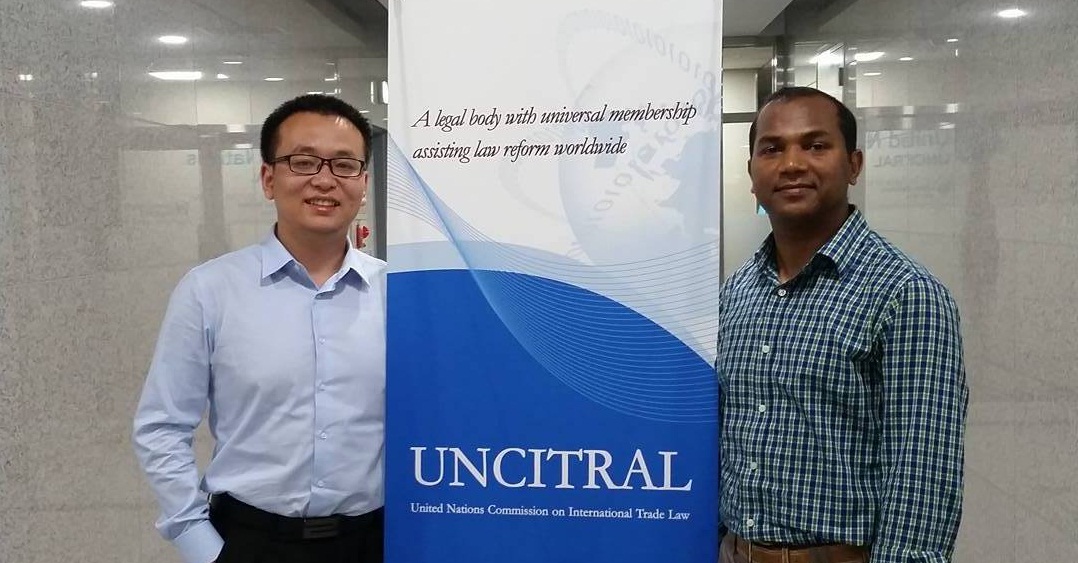
Xia Zhiyi and Mannan Bhuyan at the office corridor (Xia Zhiyi, STL 3L Student on left)
Interview with Zhiyi Xia, STL Class of 2017
I. Introduction to UNCITRAL and its Regional Centre
The United Nations Commission on International Trade Law (UNCITRAL), established 50 years ago, is the core legal body of the United Nations (UN) in the field of international trade law, focusing on the modernization and harmonization of rules on international business.
The UNCITRAL Regional Centre for Asia and the Pacific (UNCITRAL-RCAP), located in the Republic of Korea, was established in 2012 and its main objectives include: (a) promote the dissemination of international trade norms and standards, in particular, those elaborated by UNCITRAL; (b) provide technical assistance and capacity building to States with respect to the adoption and uniform interpretation of UNCITRAL texts; (c) engage in coordination activities with international and regional organizations; and (d) function as a channel of communication between States in the region and UNCITRAL.
II. My Work at UNCITRAL-RCAP
My daily work here consists of three parts: legal research, document drafting, and translation.
As to legal research work, it is mostly related to CISG and International Arbitration. For example, I was assigned to collect academic literature and judicial cases related to UNCITRAL texts, especially the 1958 New York Convention and CISG, for the past 12 months. Another unique experience was reviewing a member State’s existing arbitration law and offering comments on how to modernize and improve the legislative texts, which introduced me to a brand new perspective on the legislation of arbitration law.
Document drafting is the most challenging work. Since UNCITRAL-RCAP needs to correspond with its various counterparts in the region, most of which are governments of member States, major arbitration institutions and academic institutions, various letters of correspondence need to be prepared and transmitted every day.
Usually, I was instructed to draft correspondence from scratch and then submit my work to my supervisor for review. Sometimes I felt frustrated when I found little of my original text in the supervisor’s revised draft, but my supervisor is always very nice and I am learning a lot about how to improve my writing.
Translation work is also essential to my responsibilities since most documents that are transmitted to Chinese counterparts need to be bilingual. More translation work may be needed as the Centre is building up its Chinese web site.
In addition, I am very happy that I managed to establish a linkage between UNCITRAL-RCAP and STL through the Centre’s annual UNCITRAL Asia Pacific Day program, which aims to promote UNCITRAL texts in prestigious universities across the region. I do really hope that STL and UNCITRAL can form a good relationship in the future via my contribution and would like to encourage all STL students to contribute to STL as much as they can.
III. What Influenced My Decision to Seek the Internship at UNCITRAL-RCAP?
I have always wanted to obtain work experience within an international environment, which makes the UN a perfect option.
Indeed, it turns out that UNCITRAL-RCAP is very international with colleagues from Portugal, Korea, Bangladesh, and Hong Kong SAR.
IV. How STL Education Helped to Prepare Me for the Internship
My education in STL is truly instrumental for me to obtain the internship opportunity, as well as undertake my work here.
First, STL offers numerous courses related to UNCITRAL texts, which include the CISG, 1958 New York Convention, Mauritius Convention on Transparency, UNCITRAL Model Law, UNCITRAL Arbitration Rules, and so on. At STL, I have taken courses, such as International Commercial Arbitration Seminar, Treaty Arbitration, and CISG courses, all of which prepared me with substantive knowledge of UNCITRAL’s texts.
Second, my moot court experience in the Willem C. Vis (East) International Commercial Arbitration Moot (Vis Moot) was definitely an advantage, since UNCITRAL-RCAP is a supporter of various international moots, including the Vis Moot, International ADR Mooting Competition, and Foreign Direct Investment International Arbitration Moot.
Third, my one-semester exchange study at EBS Law School in Germany (one of STL’s foreign partner schools) was greatly valued by UNCITRAL-RCAP. According to my colleagues, almost all previous interns have studied or worked in a foreign country before, and they tend to think overseas experience can reflect the candidate’s ability to work and communicate in a cross-cultural environment.
V. Living and Working in South Korea
Since most Koreans do not speak English, it is difficult for me to communicate with them. English, however, is essential for my work at UNCITRAL-RCAP. Proficiency in Korean is not essential to my work or to my ability to live and travel throughout the country.
UNCITRAL-RCAP’s office is located in the Central Park of Incheon city, one of the most beautiful and cozy business districts in Korea. In general, the working environment here is nearly perfect, except for its high accommodation costs.
Since there are many international organizations in the surrounding area, there are many activities available for foreigners, such as Korean cooking day and Korean language courses. All of these activities, which provide a platform for networking, are free of charge, which is important for non-paid interns.
In addition, I was very lucky to homestay in a Korean family where all members could speak very good English. They invited me to join their family trip and barbecue together, which was really a great experience.
VI. Others
During the internship, I also learned about the UN’s recruitment system and I truly feel that STL graduates are perfect candidates for UN jobs due to our unique Juris Doctor and Juris Master education.
All UN recruitment information is available on the UN careers website, and I would like to encourage more STL students to apply for both internship and full-time positions in the future.